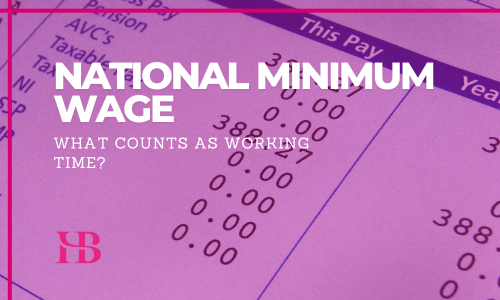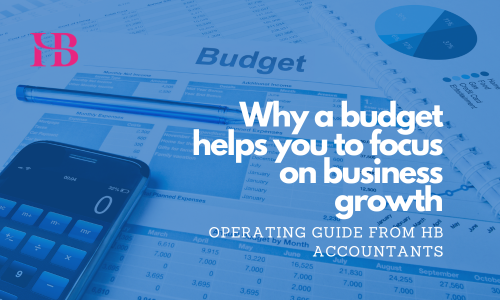A number of workers are not being paid the National Minimum Wage (NMW). Often, this isn’t intentional, it’s because the NMW is more than just a pay rate, it’s a calculation. The main reason why so many companies accidentally underpay their workers is because they do not know about the calculation. Here is the HB overview of the NMW – our payroll team is always on hand if you need advice.

What is working time?
The National Minimum Wage and National Living Wage are worked out as hourly rates. But they apply to all eligible workers, even if they do different types of work or are paid an annual salary.
The National Minimum Wage is calculated on an employee’s total pay before tax and National Insurance (NI) are taken out. Payments that count towards the minimum wage include basic pay and incentive pay, as well as any bonuses and commission.
Payments that are NOT included in the NMW calculations include tips, extra pay for working bank holidays or overtime, a loan or pay advance, expense repayments, redundancy or ‘benefits in kind’ given through a salary sacrifice arrangement – for example, childcare vouchers, meal vouchers, company car and fuel, or a work mobile phone.
The minimum national wage calculation
On average, an employee or worker must get the minimum wage for each ‘pay reference period’. This is the period of time their pay covers, for example a week or a month.
The average hourly rate is worked out by taking the:
- ‘gross’ pay each time someone’s paid – this is the total pay before tax and National Insurance (NI) are taken out – divided by
- how many hours someone worked for that pay
Example of working out average hourly rate
Jane is paid weekly and she works 40 hours a week. Her weekly salary is £500 before tax. She’s 30 years old and not an apprentice. £500 divided by 40 means her average hourly rate is £12.50. This is above the minimum wage.
What is ‘working time’ for NMW?
The definition of ‘working time’ under NMW rules are the hours when a worker is available, and required to be available, at or near a place of work. You can only include time spent on tasks including travelling to training and being on standby. It does not include holidays and travelling between home and the usual place of work.
There are additional rules for workers that are permitted to sleep during their shift.
Reasons why unpaid working time issues arise
It is imperative that employers keep records to cover themselves in case of an investigation by HMRC. This is usually because HMRC believes that a worker is not being paid the correct NMW. Here are just a few scenarios that may cause HMRC to investigate further along with our suggested ways to mitigate the issue.
- Arriving before or leaving after shift time – HMRC may question why the employee is at work but not being paid. Of course, there could be a genuine reason such as they arrive early to miss busy commuter traffic.
What to do: Keep records to demonstrate that this additional time in the workplace is the employee’s choice – you could get the employee to sign to this effect.
Be aware: if you require pre-work tasks such as changing into uniform. This is likely to be considered working time.
- 2. The worker is asked to come in early or stay late for work purposes.
What to do: count this as working time.
Be aware of: managers asking workers to come in early for team meetings, or to do a shift handover but not record this as working time.
- 3. Forgetting to clock in or clock out
What to do: If a worker forgets to clock in or out, keep a clear audit trail that shows it was a mistake and that the worker was not accruing unpaid overtime.
- 4. Break times
What to do: Keep evidence that workers take their breaks and note the time taken.
- 5. Time off in lieu (“TOIL”)
Be aware that: The concept of TOIL does not exist for NMW purposes if you workers are paid by the hour.
What to do: Put controls in place to monitor additional time worked that isn’t taken back in the same pay period to show that you are complying with NMW requirements.
Allowable minimum wage deductions
An employer is allowed to make some deductions, which could leave someone with less than the minimum wage in their take-home pay. Allowable deductions include tax and National Insurance contributions, paying back an advance or overpayment, pension, or trade union fees.
Some pay deductions and work-related expenses can be taken but must not reduce pay below the minimum wage. These include deductions for tools, uniforms, travel costs (not getting to and from work) or costs for mandatory training courses. Find out more here.
How can HB help?
Did you know that we offer payroll support services? As well as removing the stress of complying with payroll, NMW and pension schemes – the HB payroll service delivers considerable cost savings as our experienced team ensures that your team is paid correctly and on time each pay period. The key to a good payroll service? Ensure that there are clear and regular lines of communication between your business and your payroll partner, then sit back and enjoy the real benefit to your business. How can we help you?
Please feel free to contact the team on 01992 444466. We’re accountants for business and we’re here to help you grow.
The information contained above is for general guidance purposes only. Whilst every effort has been made to ensure the contents are accurate, please note that each individual has different circumstances and it is essential that you seek appropriate professional advice before you act on any of the information contained herein. HB Accountants can accept no liability for any errors or omission or for any person acting on or refraining from acting on the information provided in the above
Read latest updates below or click here for more







